#anti netflixvania
Text
i don't have it in me at the moment to make a long, detailed rant about this but r/castlevania's insistence that games!Isaac is a lesser character for being a "self-harm obsessed, shallow BDSM playboy that only serves as an inciting incident" compared to N!Isaac?
first of all, i think y'all are letting anime stereotypes from the early 2000s massively color your opinion and it's really obvious you didn't bother looking at his character any deeper than that.
edit: i'm putting this under a cut because it was actually, in hindsight, a pretty long post lmao
"BDSM playboy"? my man was sitting in the ruins of his home for 3 goddamn years letting the clothes rot off his back, in no condition to care about his appearance and with precious little materials to forge something new. you could also argue that his skimpy look is a mark of his arrogance (already well-established by his fight with Hector previously, and feeling so cocksure he sends his Devil away and even arms Hector with a sword, confident he could easily take him in a fair fight), going into battle barely clothed as a show of faith in his own skill after playing Hector like a fiddle. or even as a radical show of his devotion, the Devil Forgemasters crest embedded in his skin for the world to see; the fact that the physical marks of his position may fade away, but it goes so much deeper than that - it's seared into his very flesh, and will only die when he and his corporeal form finally leave this earth. also, it just speaks to a really shallow understanding of BDSM in general to associate "skimpy strappy outfit = kinky"
"self-harm obsessed"? first of all, where is ANYONE getting this notion from the game itself?? (considering there's a very low chance these people even know about the mangas) there is literally no scene in-game where he self-harms - further proof people are grafting a grab bag of stereotyped character traits onto him when the canon doesn't support it. if this is about his tattoos, i consider this a bit of a reach, but then i don't regularly associate tattoos with masochism.
there is of course this one, singular panel from Prelude to Revenge where we see him slitting his wrists:
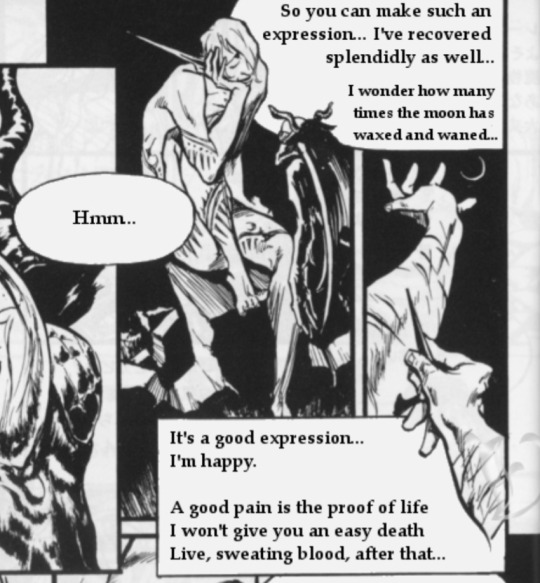
but the context here makes it clear: 1) he's doing this as a morbid way to mark the passage of time and 2) most likely in response to the sheer contrast between him and Hector's respective situations - how would you feel seeing the guy who was at least partially responsible for your predicament living a happy life, while you're forced to live in the abandoned ruins of your home, constantly surrounded by all that you've lost? this is an act being shown when he's at his very lowest.
and this is the only instance we actually see - there is no other official material that implies this is something he does on the regular, although it's a popular headcanon considering the general fandom consensus that he most likely had a very rough start to life.
shitting on him for being "merely an inciting incident"? i don't even know what to say to this - do you understand how characters and stories work...? the narrative lives and dies on the push and pull of characters taking actions and other characters responding!
but it sure is curious (read: hypocritical) that this is a negative in these people's eyes when you point out the similarities between Lisa's and Rosaly's deaths.
sure, there is a bigger story about the cruelty of humanity as a whole that Lisa was executed, unprompted while Rosaly's execution was deliberately manipulated by Isaac - but that also adds to Isaac's character, the fact that both he and his younger sister were persecuted for being bonafide magic practitioners, and the sheer hypocrisy of and underhandedness of knowing that pain firsthand, and choosing to inflict it on an innocent woman anyway. it really shows how much his morals, if he ever had any, has truly eroded to the point he only cares about causing maximum damage.
i don't even want to waste my words on the ways N!Isaac is a worse character, comparatively, if you actually take into account the themes of the Devil Forgemasters' respective stories as presented in the games. but it does chap my asshole that, from this angle, both N!Isaac and N!Hector end up for the worse since now their stories are completely decoupled and it ruins the symbolism and duality that their game counterparts had.
#raaaaaaaggghhhhhhh CHUMPO SMASH!!!!#castlevania#anti netflixvania#isaac laforeze#isaac castlevania#castlevaniaposting#<- N!Isaac dickriders you WILL read my posts and quit acting smug#akumajou dracula
39 notes
·
View notes
Text

the quartet of "wow your story hates your guts for no reason can I adopt you" rise up
#netflix castlevania#anti netflixvania#omori#omori game#omori critical#omori basil#omori mari#basil is technically a criminal but tbh his only crime is going for sunny's eye instead of a major artery#mari is pretty much rosaly but without anything that makes rosaly a genuinely awesome and interesting character
37 notes
·
View notes
Text
Mathias' actions can't be really justified when you analyse. Lost your wife? I understand the pain when they pass away. Go to revenge against the God and use everyone in your plan? That is how you could lose the trust.
Literally, Mathais went to Leon after he defeated Walter only to tell to Leon that they are no different. But is difference between a person that died from illness and a person that died because of your selfish plans.
Even after he changed his name to Dracula, he puts his ambitons over the others. Lisa begged to not harm humans, but after she died Dracula ordered his demons to kill all humans, no mater if they are innocent or not. He goes so far even want to destroy Alucard's human side and forcing him to join him.
In games, Dracula meant to be like Satan on Earth, to be feared by all and Belmonts to defeat his evil forces. And what Netfix does? Turn Dracula intro a meow meow man that deserve better and Belmonts intro a bunch of hunter that are nothing special.
#akumajou dracula#anti netflixvania#dracula (castlevania)#mathias cronqvist#not all actions can be justified drac#but unlike netfixvania the does a meow meow dracula#in games he is the devil itself after his wife's death
26 notes
·
View notes
Text
Maybe this is just me being autistic or something, but I do not understand how movie/TV adaptations of games are so hard to make. The original media is right there??? Just use it as a basis for your script?????? Add and subtract where necessary for the medium while still keeping it the same story at heart????????? “But it’d be boring if it was a whole tv show” ok then why is it not boring as a game???????????? Why do people replay games then???????????????????? I don’t get it.
#yeah this is about Castlevania#text post#like I watched multiple adaptations of Dracula#because I wanted the story of Dracula#I’d have been mad if it was a Dracula adaptation called Dracula and then wasn’t the story of the novel besides a couple character names#so why is it any different for games#if anything like you have more room in game adaptations#you can just adapt everything that’s there and add a ton of character development stuff that the game didn’t have space for?#ez???#idk I’m probs just stupid#might delete later cause this is dumb#anti netflixvania#just random ranting ig
56 notes
·
View notes
Text

Absolute lol and lmao


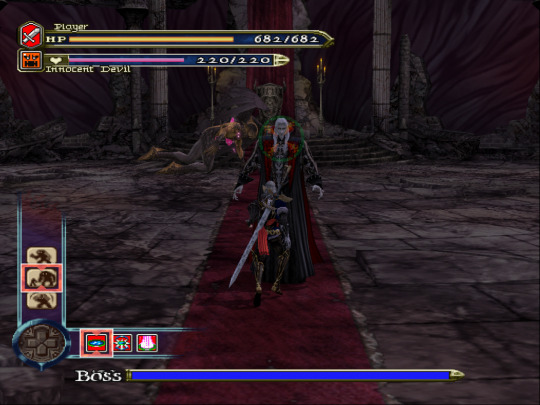

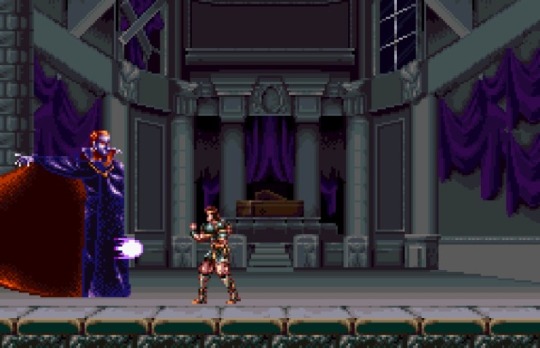
They literally shrank the dark lord and now he is barely a head taller than everyone when everyone used to be at his crotch level 😔
#anti netflixvania#i could get screenshots from more games but eh#i am sick i don't wanna do it 😔#anyway this is illegal#shrinking jail time for whoever decided Dracula was going to be this small
31 notes
·
View notes
Text
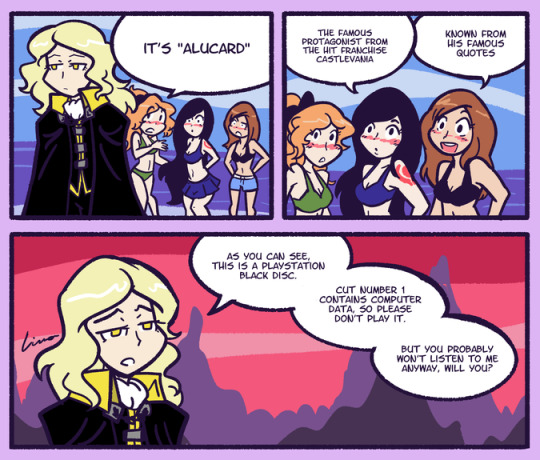



OG castlevania fan comics
#castlevania#original castlevania#comics#juste belmont#adrian alucard tepes#leon belmont#soma cruz#antinetflixvania#anti netflixvania#anti netflix
85 notes
·
View notes
Text
Ok I’m sorry Juste looks like shit! Here is a comparison between Henri Sason from innocent :
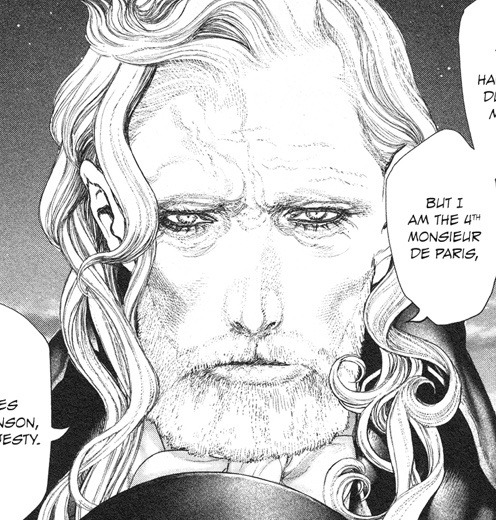

The old chad Henri vs old Virgin Juste
32 notes
·
View notes
Text
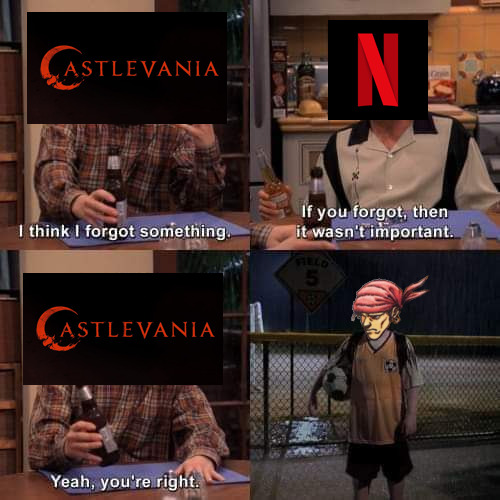
40 notes
·
View notes
Text
sometimes i have to remind myself about the fact that netflixvania and warren ellis, specifically, deliberately ruined hector's character over a stupid behind the scenes writers feud
like nevermind about my enjoyment as a member of the audience for a minute, how is that not considered unprofessional as hell, letting a personal dispute taint the quality of the product you're working on? and then they just left it in the show??
how did no one else that had the executive power to veto these kind of bad decisions not step in and say "hey, no. we know why you're doing this, we're not going to tolerate you writing in an attack on the other writer - go back to the drafting board and sort your shit out"
like sometimes i get worried an email i sent out is a bit too terse, and there's just asshats like this running around with ego trips without so much as a word against their bad behavior. boggles the mind really.
i hope one day someone spills all the ugly tea about what exactly happened back there. or even better, although this is more of a pipe dream, konami finally recognizes how much the shows are doing to revive interest in castlevania, but after seeing how much of a shitshow the showrunners can be (between the aforementioned feud and ellis later coming out a sex pest), decide they'll still do shows at the very least but give the license to a different studio to pull off
the way nocturne is going, with a much more lukewarm reception this time around, i feel like there's a chance the latter could still happen.
#anti netflixvania#not that adi shankar is any better btw#from what i've seen of the dude he similarly is way too invested in his own ideas and ability to pull them off#so i dont even think ellis *not* ironically being a huge manbaby about things would've done anything for the quality of the show
37 notes
·
View notes
Text
Dracula in Netflixvania: how small changes in lore build up to disaster
Changes in adaptations are bound to happen. Cuts in the lore are bound to happen. But I find incredible how so many tiny changes in the lore of Castlevania brought by NFCV, apparently innocuous or even improvements according to some, actually lead to the narrative completely falling apart both as an adaptation and as its own story.
Let's start with the biggest change:
Lament of Innocence didn't happen.
Everything has been covered in this clear thread. To summarize what this change affects:
Dracula in the games started out as Mathias Cronqvist, a man who, wracked by grief for the loss of his wife Elisabetha, rebelled against God and concocted a plan to turn into a vampire and have Death as his loyal servant. In the show, he's just "the oldest vampire", with no clearer origins. (in the games Dracula wasn't even the oldest vampire, Walter and Joachim already existed, but they don't matter for this list)
Leon Belmont in LoI was a crusader who had to throw away his title to rescue Sara, his fiancée. He was involved in Mathias' selfish plan, that lead to Sara's death, and cursed him to be hunted by his descendants for the rest of time: what makes it more painful is that the two used to be best friends. In the show, Leon was already a vampire hunter while fighting in crusades, and only moved from France to Wallachia to hunt Dracula, whom he had no previous relationship with.
The Vampire Killer in the games is the strongest holy weapon against dark creatures, due to it being infused with Sara's soul. There are other whips in the setting, but none can match the Vampire Killer. In the show, it's just a regular consecrated whip, and Trevor also fights with the Morning Star (turned from a powered up version of the VK to a different object) and Leon's longsword (the Belmonts in the games never use swords).
But these can be forgiven as small changes in adaptation, one could say. Elisabetha was cut because, really, she was a non-entity. Sara was cut because the VK can work just fine without her. Leon doesn't need to be Mathias' bestie, the Belmonts can fight Dracula out of the goodness of their heart.
All valid arguments. But this is just the beginning.
Dracula hunted humans before Lisa showed up.
We don't know in detail what Dracula was up to between LoI and CV3. For all intents and purposes, he focused on honing his new vampire powers, moved to Wallachia, made himself a nice castle, and... chilled there. Perhaps he became the voivode of the land, the historical Vlad Țepeș.
It's heavily implied, though, that he had zero beef with humanity, and in fact he was willing to help certain people as long as they were against God, Dracula's one enemy at the time.
Hector and Isaac are, of course, the proof of this.
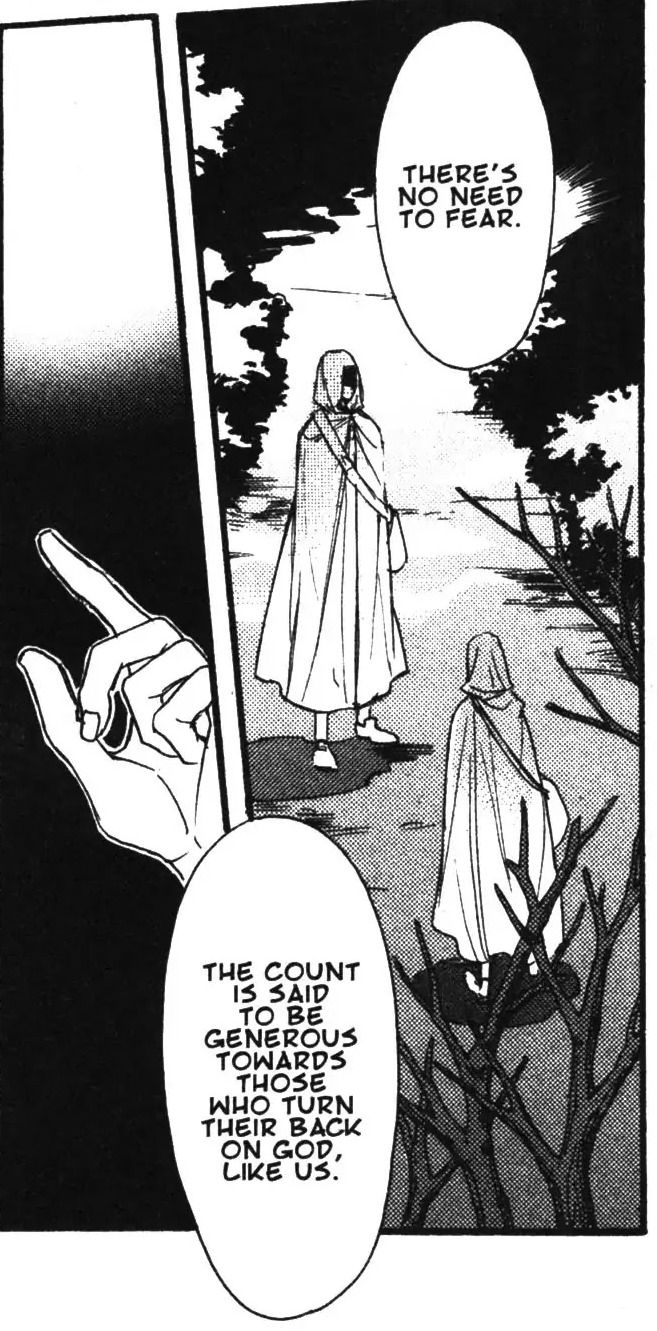
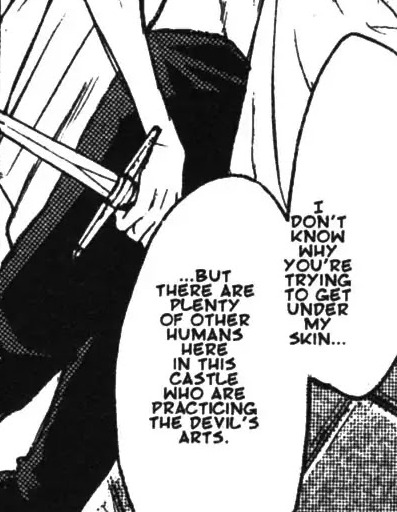
But even without the extra material, they were two humans who were welcomed in his court and served under him, in an extremely important role to boot.
(to be fair, the show gives an alternative and decent explanation for the Forgemasters' presence as humans in Dracula's court: the fact that they're willing to kill their own kind proves to him how trustworthy they are. A detail that was changed but on its own does not break the lore: good job!)
Alucard in GoS gives us these intriguing words:
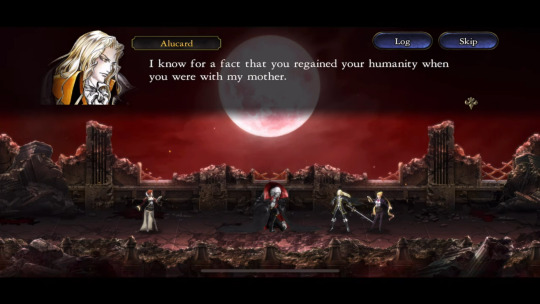
which not only emphasize how Lisa brought to light Dracula's better side, but even imply that she briefly reversed the corruption brought by vampirism. It makes more believable why such a pure-hearted woman would fall in love with him.
Instead, the show directly opens with Lisa marching through Dracula's courtyard, infested with impaled skeletons, and flirting with the guy. And if this could be justified if one imagines that those humans attacked Dracula's first, the flashback in Season 2, where he's shown having a grand old time going on a killing spree because some merchants "disrespected" him, proves that no, he was an outright monster when Lisa met him.

Due to the first season and the finale's rushed nature, it's harder to imagine why would Lisa find a kernel of humanity in this vampire. She doesn't come off too good either.
Why does it matter?: despite his grief having a more prominent role in the story, Dracula is actually less sympathetic in this version. This wouldn't be terrible, as he is meant to be a tragic yet intimidating villain, if it weren't for the fact that the show paints him as utterly pitiable, and it's even known for "giving him depth". Shankar himself sees him as the hero of his own story.
In the show, Carmilla keeps asking why didn't Dracula turn Lisa into a vampire. With game Dracula, one can believe that he valued her humanity so much that he was willing to let her die of old age eventually, as long as she died as herself. The show, instead, never gives us an answer, because the question isn't meant to paint him in a noble light, but as an idiot who doesn't know what he's doing.
Lisa is less compassionate towards humanity.
Lisa's death is very different between Symphony of the Night and show. In the latter she got burned at the stake, while in the former she was crucified and we can assume she bled to death. This affects two factors.
One, in the game, we know that Alucard stayed with his mother until her last breath, allowing her to speak her last words to her son. In the show, Lisa dies alone shouting in the hopes that Dracula hears her. The title sequence of the first episode shows Alucard kneeling in front of Lisa, but this is not shown in the actual story, and there is no further indication that he was actually there: realistically, it's not possible.
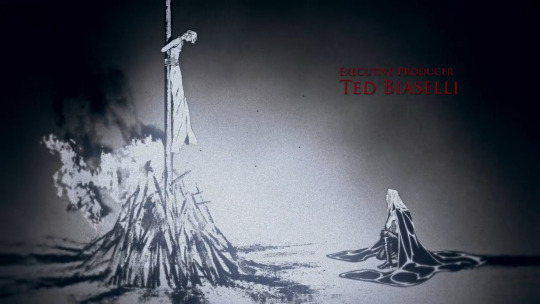
Two, her last words are also different.
SoTN (ENG): "She said "Do not hate humans. If you cannot live with them, then at least do them no harm. For their's is already a hard lot. She also said to tell you that she would love you for all of eternity…"
SoTN (JP): "Do not blame humans. She said that those unable to forgive mankind will walk the path of their own destruction. Those who do not belong to that world shouldn't do anything... And Father... she said that she will love you forever."
NFCV: "Don't hurt them! They don't understand! I know it's not your fault, but... if you can hear... they don't know what they're doing. Be better than them. Please!"
Lisa in the game holds no ill will towards humans. She urges Alucard not to resent them, and understand that their lives are already difficult. She even attempts to find a compromise for ease of his mind: if he truly can't forgive, may he at least leave them alone. In Japanese, she emphasizes that hating humans will only be detrimental, a somber foreshadowing of Dracula's downfall. And finally, she parts with a last thought to her husband, a soft declaration of love. The tragedy here is that Alucard kept Lisa's words dear to his heart, but he could not tell them to Dracula, who instead used Lisa's memory as a weapon to wage war on mankind. By the time Alucard reveals Lisa's final wish, three hundred years later, it's too late.
Lisa in the show doesn't sound the same. Not only she ignores her son completely, but her focus seems to wanting to appease Dracula, who might or might not be hearing her, it's ambiguous. She quotes Jesus speaking to God, but she sounds more like an abused wife scared of her abusive husband's rage, a sentiment echoed in S2. She also puts emphasis on how "it's not his fault", as if to absolve Dracula of the responsibility of his reaction, and that Dracula should be "better than them", implying that she thinks lowly of them and wants Dracula to be superior. Not exactly compassionate.
Why does it matter? 1: the show had a chance to flesh out Lisa and Alucard's relationship as mother and son, and it squanders it to further emphasize Lisa's already established attachment to Dracula. Not only it cheapens Alucard's attachment to the mother he fights his father for (he, bafflingly, even says "Then find the one who did the deed", which misses the entire point of his character), this becomes much worse by the time of the finale, as I describe below.
Why does it matter? 2: Lisa, once again, loses sympathy points. The inherent hypocrisy of Dracula disrespecting Lisa's memory is never breached in the show, which prefers to focus on his shortsightedness, but Lisa's wish herself is not as purehearted in the show. In fact, as I said, her relationship with Dracula sounds quite unhealthy now, which of course never gets acknowledged.
Dracula hired Hector and Isaac shortly after Lisa was killed.
There are so many changes brought to the lore of the Devil Forgemasters that they deserve their own post. Each change only causes more logical problems in the show's plot, and it makes the villain story in Season 2 fall apart.
In the prequels, both Devil Forgemasters went to knock on Dracula's door on their own volition, to study the dark arts and live in a place that would accept them. In the show, it's the other way around: after Lisa urges him to travel around the world, Dracula accidentally finds both of them, one in Rhodes and the other in the Sahara, and then he looks for them again once he needs them. This is not the most important change, though, as what matters is that Hector and Isaac are loyal to Dracula for being the only person kind to them, and in all fairness the trait is kept. What matters is how this affects Hector.
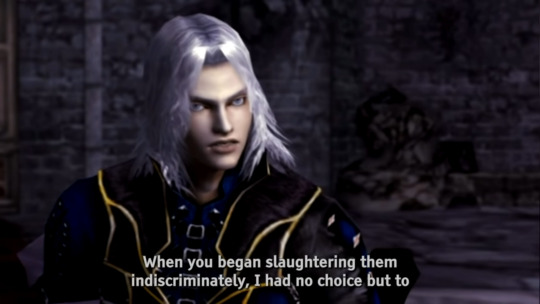
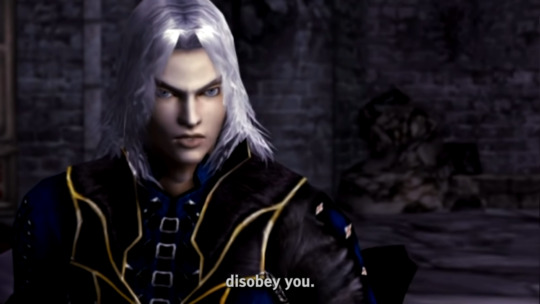
This line implies that Hector was left blindsided by Dracula's decision of exterminating mankind. This was not what he signed for! Hector never, ever wanted to harm humans, and he was so disgusted by his Lord's actions that he preferred to leave. In the show, Dracula already presents him with the idea of "stopping" humans: he means genocide, but Hector proposes that they be turned into livestock for vampires, and accepts to help him as long as there's no needless suffering.
Why does it matter? Hector started off with all the building blocks to go through a similar character arc he goes through in the CoD prequels, but he's turned into a less sympathetic character, as he was on board with turning humans into cattle from the get go. An anti-villain who'd enslave his own kind out of a misguided sense of mercy needs a carefully woven narrative to justify, and possibly redeem. We all know what happened to him.
To be fair, the story wasting Hector is not the fault of the lore changes, so there's no point in elaborating here. I will mention, however, that some fans genuinely believe Hector deserved to be enslaved and raped precisely because of his original plan, which makes the narrative even grosser.
Why does it matter? 2: Dracula lying to Hector to gain his help because "he's a child in a man's body" and thus "he's easy to lie to" devalues Hector, his intelligence (most obvious in his scenes with Lenore, where it's clear that he didn't think too deeply about Dracula's plans and she takes advantage of that weakness), and even Dracula himself who apparently doesn't trust the man enough with his real plans, but trusts him enough with the role of a General of his army... even as he's shouting in the war room that he doesn't enjoy paddling in the blood of innocents. It's never made clear why would Dracula even keep Hector around in the show when Isaac is presented as much stronger and smarter overall, while in the prequels, Dracula respected and trusted both (but favored Hector). Even worse, Season 3 confirms that Dracula did not invent the art of Devil Forging, but it's a type of highly advanced magic that nevertheless is fairly well known in certain circles - so then why did Dracula go out of his way to hire someone who didn't even fully agree with his plan, when there are other Forgemasters around who might be just as fanatical as Isaac?
(the reason might be in the stats sheets that came out with Season 2, that implied that Hector and Isaac were meant to be both physically weak, with the former slightly stronger and more powerful in "necromancing" than the latter. Clearly, something was changed during production to make Isaac the hypercompetent one and Hector the ineffectual one, but this part of the plot would have only worked if Hector was deemed absolutely vital to Dracula's plan)
Why does it matter? 3: Hector and Isaac only worked under Dracula for a year, and they're already called Generals. In the prequels, it's implied they spent years studying under him and gaining experience, both in the alchemy lab and in the battlefield, which is why they're called Generals in the first place (unlike the show version, who allegedly aren't even physical fighters). While Dracula explains that he trusts them due to being humans willing to exterminate other humans, it's questionable that Dracula would trust their qualifications so much; this is made even worse by the fact that Hector was "hired" thanks to a lie. When all three of them fall for Carmilla's plan, I struggle to sympathize with them, so I chalk this up to a worldbuilding and storyline failure.
Addendum: the show makes a frequent point, through Carmilla and Lenore and the Captain, that Dracula might have planned to kill Hector and Isaac together with all the humans: Isaac accepted this fate, Hector could be manipulated at the other vampires' leisure. It also paints Hector as even more of an idiot for not wanting a reward for his work, which gives even more leverage to Lenore. The mangas actually give a much more understandable reason for both points, tied with what above. I'm not making this an entire section because the result is the same: by changing the lore, Dracula comes off as more insane and hypocritical than he is, Hector comes off as profoundly stupid, and even Isaac's relationship with Dracula is now contradictory.
Dracula never became the Dark Lord.
When Elisabetha died. Mathias became a vampire through the Crimson Stone. When Lisa died, Dracula made a pact with Chaos/The Evil God to become the Dark Lord, the Avatar of Chaos on Earth. This makes Dracula far more than a vampire, and something closer to Satan, a truly terrifying figure. His penchant for cursing and possessing also proves this. Dracula, through his own actions, became the incarnation of evil.
Needless to say, Chaos isn't even hinted at in the show.
Why does it matter?: despite his posturing, Dracula is nothing special. He is in theory respected by other vampires for being the oldest and most knowledgeable one, but even that is not true, as the first thing Carmilla does is disrespect him in front of his whole court. His abilities also pale compare to what he can do in the games - while he showcases his iconic Hellfire, he doesn't even turn into his monster form!
Death is not Dracula's loyal confidant.
In the games, Death is a creature born from Chaos, and bound to serve the wielder of the Crimson Stone. Mathias was able to get his help to complete his transformation into a vampire, and since then, Death has stuck with the Dark Lord through thick and thin. Not only he's often responsible for Dracula's resurrection through the centuries, but he's pretty much described as the closest thing the vampire has to a confidant and friend.
No Crimson Stone = no Death. The role of confidant is taken by Isaac, strangely enough, with a Dracula being seriously concerned about their friendship (and this only highlights how differently Isaac and Hector are treated).
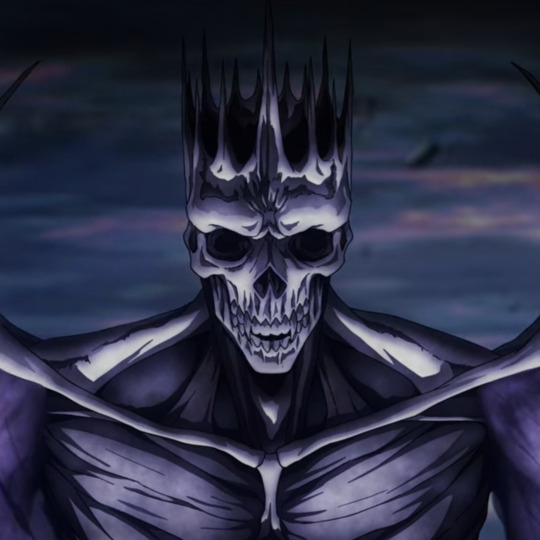
Death doesn't appear until Season 4, and he has a completely different role: he's the man behind the scenes who wants to revive Dracula, which so far is canon compliant... but he wants to use Dracula by giving him a fate worse than death, in the hopes of driving him insane and pushing him to kill as many people as possible, again. Dracula is nothing but a tool to Death, who is described as being a different type of vampiric creature.
Why does it matter?: it's yet another way Dracula is weakened and disrespected by the narrative. Constantly presenting new semi-original villains and having them insulting the main antagonist of the franchise or playing them as pawns is just tasteless.
Dracula and Lisa are brought back to life in the finale.
Death does manage to accomplish part of his plan: with St. Germain's help, he calls back Dracula's and Lisa's souls from Hell to be fused into a Rebis. After Trevor destroys Death, the two return to normal. Happy to be once again together, they decide to spend the rest of their lives together travelling around the world like they were set to do, leaving Alucard alone.
Why does it matter?: it completely shatters the whole point of the cycle of death and rebirth Dracula and the Belmonts are stuck under. Dracula in the games is brought back into the human world by mankind's evil and desires, forced by Chaos to be its avatar and a harbinger of evil. It's implied that even he grew tired of it all, which is why being reincarnated into Soma is a chance of a new start for him. By having Lisa to his side again, Dracula has no reason to hate mankind anymore. Since Chaos doesn't exist in the show, Dracula is completely free, and the year he spent planning mass extermination and suicide is quickly brushed off. We are left questioning what exactly Dracula will do now with his new life, and what he will do after Lisa's natural death.
As of Season 1 of Nocturne, he seems to have faded into obscurity: the first of the two times he is mentioned (the second time from Alucard introducing himself), it's from Juste, in a line like this:
"Whatever it is, evil. And it's everywhere. It will always be stronger than us. And you can kill this or that devil. A Lord Ruthven, a Dracula, maybe even an Olrox. But there'll always be more, more and worse."
Put in the middle as if he were a random vampire, implicitly listed as less impressive than Olrox. And to add insult to injury, Annette, who somehow knew all about Forgemasters, has no idea who he is.
In short, Castlevania, the series named after Dracula's own castle and domain, barely has Dracula as its villain, and in the short screentime he had he was blatantly disrespected.
But he's far from being the only one.
The Belmonts are incredibly nerfed.
To recap. The Belmonts are a generic clan of vampire hunters, for which Dracula is just another vampire. The two have no connection. The Vampire Killer is nowhere near as impressive as its game counterpart, regardless of the flashy animation of the fight. During the fight with Dracula, not even the Morning Star could scratch him. Dracula recognizes Trevor as a Belmont because he attempts to punch him in the face, to no avail. It's implied that, before Trevor, his ancestors went to fight Dracula. And failed. Possibly died.
The Belmonts... don't come off as being particularly heroic.
And this leads to the biggest sin: Trevor couldn't kill Dracula.
I repeat: Trevor Belmont was not the one who killed Dracula. And a weaker version to boot. He dies because he has an emotional breakdown at the sight of Alucard's childhood room, realizing too late that he's "killing his boy", and it's "his boy" who stakes him through the heart.
So much for him being the Legendary Belmont in the games, right?
Why does it matter?: The narrative feels somewhat disdainful of the protagonists of the whole franchise, let alone its own.
Alucard being Dracula's effective killer is the result of Season 2 focusing mostly on their strained father/son relationship, which has its place to be sure, but it's as if the writers copypasted the emotional climax of Symphony of the Night in what is supposed to be an adaptation of Dracula's Curse.
Generally speaking, Trevor gets the shaft in his own story. He did kill Death, the final villain of the show, but Death hardly matters in the grand scheme of things compared to Dracula. The narrative's focus was spread through too many plotlines, and clearly favored Alucard and Isaac (and Hector's plotline, but not for him). Trevor and Sypha, stuck to playing hero in random villages in Season 3 and 4, are by far the most wasted protagonists of the bunch.
The writers seem to have grown bored with the main protagonist, because other characters became more popular. It's amateurish, and once again, disrespectful to the source material: yes, not all games have a Belmont as the protagonist and sometimes they use some flimsy excuses to push them to the sides, but at least they accomplish stuff.
And this leads to...
Richter in Nocturne has lost the entire point of himself.

Richter Belmont is famous for being the turning point in the Belmont clan. While, chronologically, Juste already grappled with his own fate, Richter is the one who completely falls apart because of his legacy. For 300 years, his ancestors were born, raised and died knowing that some of them will have to destroy Dracula. Richter wrapped his identity around being a Belmont, and being tasked with killing Dracula, which he did eagerly... so when he did, he suddenly realized he had nothing to live for. He wanted to keep fighting for eternity, to give a purpose to himself. And that's how Shaft got to him. And Richter was so distraught for the shame he has brought upon the name of his clan, that he gave the VK to the Morris clan, who kept it until 1999.
Nothing of this could be kept in Nocturne, because no Belmont has ever killed Dracula, and there is no reason to even kill him anymore after he stopped hating mankind. Richter is still proud of his heritage, but he describes it as a generic "killing vampires": as of Season 1 of Nocturne, the main source of pain for him is the death of his mother at the hands of Olrox, a very different and IMO much more cliché tragic backstory.
Why does it matter?: between this, Trevor being a glorified prop, and Juste being reduced to a depressed cynical mentor, plus the OC Julia getting killed in an uncerimonious way to fuel Richter's angst, there is a sad pattern of the show almost resenting the Belmont clan as a whole. What is the point of adapting Richter's story, if his story simply cannot happen?
Richter thought Alucard was just a myth.
In SoTN, Richter immediately recognizes Alucard as the one who helped his ancestor Trevor. The implication is that the knowledge of Trevor's feats had been passed down, and survived for 300 years. Apparently, no such thing happened in Nocturne.
Why does it matter?: since Trevor did absolutely nothing of importance in the show, Richter's knowledge of his own clan lore is cheapened. This affects once again his supposed arc, confirmed by Sam Deats, of living up to his family legacy - what legacy?
And still they aren't the only ones affected!
Alucard doesn't hate his vampiric heritage.
In the games, Alucard's biggest internal struggle is about his dual nature. Both a vampire and a human, son of his father who wants to destroy mankind and son of his mother who asked him to cause no harm to them. The turmoil is so great that Alucard chooses to seal himself in a coffin twice over, in 1476 and in 1797: he explicitly does so because he feels tremendous guilt over having killed his father, and to protect the world from his "cursed" blood, as there is the chance that, if he dies, he will become a full-fledged vampire.
Absolutely nothing of this is kept in the show. Alucard reluctantly kills Dracula and is shown weeping about it, but he's fiercely, and weirdly, protective of vampires. This is shown in S2, where the reason he spends the entire time insulting Trevor and his lineage with cruel, callous and frankly xenophobic remarks is that they kept "a museum dedicated to the extermination of my people".
Furthermore, he never goes to sleep. The entirety of his story in S3 is caused by him going insane for the isolation over a month because Trevor and Sypha decided to travel alone, while Alucard guarded the castle and the Belmont Hold; in Nocturne, Alucard mentions that he spent the last 300 years slaying vampires (I suppose he changed his mind in the meantime).
Why does it matter? At its core, this is the show's attempt to make the vampires look more sympathetic, painting them as a noble race who don't deserve to be systematically killed (accidentally drawing unfortunate parallels with real life ethnicities). By default, it paints the Belmonts as morally grey, at best, hunters who kill innocent creatures like "children" and gruesomely display the remains.
Incidentally, while the objective was to make the vampires look more pitiable, the real consequence is that Alucard looks like a grand bastard, hating Trevor for doing his job and siding with bloodsucking monsters for reasons that are not elaborated upon. You'd think this would effect his relationship with Dracula, but it never comes up.
(Nocturne also comes off as even more disconnected to the original series now, as it reverts back to the notion that vampires are nothing more than shallow monsters to be killed without remorse)
Why does it matter? 2: a smaller consequence of Alucard never sealing himself in his coffin is that Trevor and Sypha come off as very insensitive friends for abandoning him right when he needed the most support. In Dracula's Curse, he choose to separate himself from them. This cheapens their supposed friendship even more.
But as for Alucard being awake for 300 years, we don't know enough to say how this has affected him. We'll see in S2.
And there you have it. Richter can't be Richter and Nocturne has to revolve around the French Revolution, because Lament of Innocence didn't happen in the show. And because the writers did not understand the source material and all the decisions that had been taken.
119 notes
·
View notes
Text

posted at the request of my besties :D
#the ultimate trinity of “characters who get treated like shit by the people we're supposed to consider their best friends”#netflix castlevania#anti netflixvania#omori#omori game#omori basil#sonic the hedgehog#idw sonic#whisper the wolf#fans don't look
24 notes
·
View notes
Note
May I ask your thoughts on Lords of Shadow Dracula?
Oh, I love him.
joipegr For as much shit as I give any sympathetic take on Dracula, this was one that I could stand. Mostly because of the circumstances. At least the creators divorced him so much from the original Castlevania Dracula that it feels earned. And, obviously, he's so far removed from Book Dracula that it's redundant to even point it out. They don't even call him Dracula, they call him Dracul.
So, Gabriel Belmont, right? He's in this thing called the Brotherhood of Light-- they're kind of morally grey despite the name. He's trying to defeat the Lords of Shadow so he'll be able to resurrect his dead wife who is stuck in limbo. Totally fair. See, some fantasy men lose their wives and they know how to be pragmatic about it. But it turns out that he actually can't resurrect his wife, whoops. So he takes up the name Dracul and ends up becoming the Prince of Darkness. The vibe is sort of that, no matter what, there need to be dark forces in the world they're living in, and Gabriel is the man for the job because he can keep the rest of them in check.
I think Protagonist Dracula works in Lords of Shadow because he's a Belmont in both name and function. We're rooting for him because he's gonna kill Satan, not God. In fact, he's God's silly little guy, God loves him and that's why prayer and stuff don't harm him.
It's similar, but of course not perfectly so, to Soma Cruz- the final reincarnation of Dracula in the original Castlevania timeline. In Aria and Dawn of Sorrow, he fights through an evil castle just like the Belmonts do all with the goal of preventing some cultists from turning him or some other dude into Dracula.
Compare all this to Netflixvania Dracula, who is played in too sympathetic of a light for any of his actions to feel in character. He's not evil enough, he's just a sad little man who wants to take the entire world out with him, and that's just pathetic. You watch him and his sulking and think "babe, if you want to die that bad, just do it". And then he does. He forces his son to kill him in the least climactic death ever. Boring. Why couldn't you have just died earlier, old man?
#update#people ask me things#lords of shadow#castlevania#gabriel belmont#oops i did it again i slandered the show#anti netflixvania#cbros5
37 notes
·
View notes
Text
I keep seeing posts with people talking super positively about the Belmonts and whatever and getting excited to rant about character designs and stories and Simon in particular, but then I scroll down and see the tags and am reminded against my will that Nocturne exists and that’s what they’re talking about.
#castlevania#castlevania games#text post#anti netflixvania#I’m so sick!!!!#I’m so sick of all of it!!!#this is gonna be years of this!!!#aaaaaaaaa!!!!#imagine for a bit: you like a game#ok more than just like a game like this game is your main interest and has been for years#it’s extremely important to you#and every time you look it up#you get a completely different piece of media#that shares a name but is more popular#but they’re not really the same story or thing at all#and everyone online gets mad at you if you say that they’re different#aaaaaaaaaaaaaaaaaaaaaaaaa#like imagine if the Mario bros movie came up before the games#and that’s all that people were talking about#I just aaaa#i’m so sick of everything
24 notes
·
View notes
Text
You know how the "Manchild" angle with N!Hector has no real basis in Hector's actual character, but there's this one manga line that *could* be taken entirely out of context, if we try to give them credit? That's how I feel about N!Juste and the "What on earth should I do with myself now...?" line from HoD's bad ending.
I feel like - trying to be as charitable as possible - they read that as meaning Juste would become entirely disaffected and checked out if his friends die. The first issue ofc is that they didn't actually adapt the bad ending - HoD requires Dracula's remains to have happened, and the bad ending is a result of Juste failing to understand Maxim, and having bad priorities. Not merely failing to stop a vampire in time because he wasn't strong enough. (In fact a significant portion of the impact comes from how Juste was strong enough, and that doesn't matter when it comes to what's important).
And the second issue, is that it ignores the rest of the context. Juste still has duty to carry on the Belmont line and train his successor, and, he's been set up as a dutiful man - again, that's part of the bad endings impact. That a bad end Juste was so focussed on his duty to defeating his enemies and complete his quest, he would miss that he was supposed to collect the remains, the differences between the two castles, and that there was still a way to get through to his friend.
This is why N!Juste's character still doesn't line up with game Juste, and feels so lazy(I mean. It was lazy. I think what actually happened is that they already wanted to write a stock Trevor 2.0 bitter sadman Juste to prop up their gutted Richter, and just saw this line as validating the idea). It's pretty clear to me that the line is actually meant to be anguish about how Juste just lost the two people who meant everything to him, not that he won't ever actually know what to do with himself. I maintain that a bad ending Juste would be more likely to throw himself even harder into his family role, since it's all he has left, and would have likely had a very direct hand on training his successors no matter which ending - which is already implied by the gameplay across series imo.
#I think the most infuriating thing is still how they gave N!Juste a generic character flaw Juste doesn't have#When Juste already has really compelling character flaws#Juste is Impulsive; brash; kind of oblivious; argumentative; and possibly controlling#While still clearly being an honest; courageous; and kind man who loves his friends#He's also a good combination of someone whose probably read a lot but is unwise lol#Some of his negative characteristics would probably soften with age and experience#But it's hard to picture a spirited character like him becoming N!Juste in response to trauma#Instead of just doubling down on existing flaws and becoming more overbearing and stubborn#You can't tell me Juste isn't Richter's overbearing dad lol#Best ending Juste just means Richter now has *two* exhausting dads#Anti Netflixvania
13 notes
·
View notes
Text
Seeing a post saying people who don't like N!Annette are clowns and racists, having almost thousands notes with everyone agreeing, actually hurts to see. God forbid we want to see characters not completely denatured. God forbid we want to see female characters that are strong in other ways than physical and magical. God forbid not every CV girl has to be strong and magical. God forbid we can dislike a black character for reasons completely unrelated to their skin colour.
God forbid NFCV actually makes changes that align with the games by developping characters and concepts that didn't have the chance to fully shine, instead of destroying everything and re-shaping them completely, shitting on the games' fans in the process.
"the fact that Castlevania purists are crying and shitting their pants because Annette was turned from a dansel in distress to a badass WOC will forever be the biggest clowns in the entire world."
Just because your character isn't a "damsel in distress" anymore but a "badass WOC" doesn't make her automatically better. Especially considering how your "badass WOC" is acting like a bitch for no reason sometimes (and don't get called out for it, like she is in the right. and no, her trauma might EXPLAIN her bitchiness, but it doesn't excuse it.), while the "damsel in distress" was actually kind and courageous and ready to end her own life to go against Dracula's wishes because fuck him.
If wanting NFCV to show respect for the games and it's fans and to stop using the #(magical)girlboss trope for every single important female character of theirs and show a female character being strong in a different way makes me a "purist" and a "clown", then so be it.
#i swear people who like N!Annette are way more obsessed with her skin colour than people who dislike her#the fact there's people (who have or haven't watch the show) who loves and thirst after her just because she's black... that's sad.#anti netflixvania#remember guys: badass does not mean good. And damsel in distress does not make mean bad. :)#as long as you don't abuse it. :)#and tbh I really don't see how making every female character a girlboss#is any different than a show that would make them all damsels in distress#it's annoying and insulting both ways.
34 notes
·
View notes
Note

Somehow, "pathetic old man" doesn't sound annoying when it comes from Griffith :P
More seriously, I was thinking. You joked that Carmilla is basically a shitty Griffith, because she's also all about her dreams and schemes, right?
But the difference is that Griffith would genuinely do anything to achieve his dream. We see the lenghts he went through, the emotional toll it took, why he'd be inspiring to the Band of the Hawks and why Casca would worship the very ground he walks on. Even his background, while not fleshed out, feels like a hanging presence in his thoughts.
Carmilla? She achieves what she wants by either delegating the annoying details to the other sisters, or she just gets what she wants by using some pretty words to the designated dumbass. And, of course, her only motivation is her repeating ad nauseam "men bad, I deserve their stuff".
Just saying what a compelling character looks like :P
That's because Carmilla's not a character
She's a stereotypical men hating radfem designed for a double purpose:
1) Be loved as a #queen by other so called feminists on social media for being "great female representation" aka being a stronk woman by shitting on men all day
2) Serve as a good laugh to actual sexist hacks like Ellis, who probably felt like a genius for creating something that others considered deep and moving while he was just dicking around thinking "Oh you want a strong woman? Yeah I'll give you a strong woman"
Also the difference is that Griffith's plans were actually smart and his mental breakdown made sense
14 notes
·
View notes